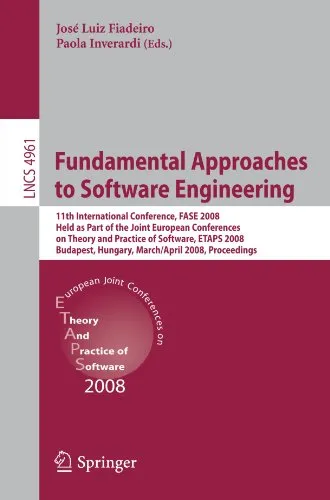Fundamental Approaches to Software Engineering: 11th International Conference, FASE 2008, Held as Part of the Joint European Conferences on Theory and Practice of Software, ETAPS 2008, Budapest, Hungary, March 29-April 6, 2008. Proceedings
4.0
بر اساس نظر کاربران

شما میتونید سوالاتتون در باره کتاب رو از هوش مصنوعیش بعد از ورود بپرسید
هر دانلود یا پرسش از هوش مصنوعی 2 امتیاز لازم دارد، برای بدست آوردن امتیاز رایگان، به صفحه ی راهنمای امتیازات سر بزنید و یک سری کار ارزشمند انجام بدینمعرفی جامع کتاب "Fundamental Approaches to Software Engineering: 11th International Conference, FASE 2008"
کتاب "Fundamental Approaches to Software Engineering: 11th International Conference, FASE 2008" یکی از معتبرترین آثار در زمینه مهندسی نرمافزار است که در چارچوب کنفرانس بینالمللی FASE که بخشی از Joint European Conferences on Theory and Practice of Software (ETAPS) است، ارائه شده است. این اثر ارزشمند شامل مجموعهای از پژوهشهای برجسته و پیشرفته در عرصه اصول و روشهای اساسی مهندسی نرمافزار است و در سال 2008 در بوداپست، مجارستان، برگزار شده است.
خلاصهای از کتاب
این کتاب شامل مجموعهای از مقالات منتخب ارائهشده در کنفرانس FASE 2008 است و به موضوعات مختلف در حوزههای تئوری و عمل مهندسی نرمافزار میپردازد. هدف اصلی این کنفرانس بررسی و معرفی روشهای نوین برای بهبود فرآیند توسعه نرمافزار و همچنین کاربرد اصول اساسی مهندسی برای تضمین کیفیت نرمافزار و مطابقت آن با نیازهای کاربران است. موضوعاتی مانند مدلسازی نرمافزار، تحلیل formal، ابزارهای طراحی، Techniques verification و Testing از اصلیترین مباحث مطرحشده در این کتاب به شمار میروند.
مقالات کتاب در سه بخش کلی تقسیمبندی شدهاند: تئوریهای پایهای، ابزارها و تکنیکهای عملی، و کاربردها. هر بخش با دیدگاهی عمیق به چالشهای موجود در مهندسی نرمافزار میپردازد و بررسیهای دقیق و پژوهشهای کاربردی را ارائه میدهد.
نکات کلیدی استخراجشده از کتاب
- معرفی جدیدترین تکنیکهای تحلیل formal و کاربرد آنها در فرآیند توسعه نرمافزار.
- تاکید بر اهمیت Model-Driven Development و روشهای مربوط به آن.
- پرداختن به Testing تکنیکهای بهینهسازی و تضمین کیفیت در چرخه عمر نرمافزار.
- نقش و اهمیت ابزارهای خودکارسازی در بهبود کارایی توسعهدهندگان و تیمهای نرمافزاری.
- مرور دقیق بر Integration بین تئوریهای formal و فرآیندهای عملی توسعه نرمافزار.
جملات معروف از کتاب
"Software engineering is a disciplined and systematic approach to developing software systems, yet its progress lies in understanding the complexity of modern applications and devising methods to tame their underlying challenges."
"Formal methods are not just abstract theories; they can bring tangible benefits by ensuring correctness and reliability in real-world software systems."
اهمیت این کتاب
کتاب "Fundamental Approaches to Software Engineering" یکی از منابع مرجع در زمینه مهندسی نرمافزار است که نهتنها برای پژوهشگران بلکه برای توسعهدهندگان حرفهای نیز اهمیت ویژهای دارد. دلیل این اهمیت، توجه به جنبههای بنیادی و همزمان کاربردی در مهندسی نرمافزار است که با ترکیبی از تئوریهای formal و تکنیکهای عملی پویایی حوزه نرمافزار را برجسته میکند. این کتاب همچنین مسیری را برای توسعه روشهای جدید و یافتن پاسخهایی به چالشهای معاصر ارائه میدهد.
این مجموعه به دلیل ارائه پژوهشهای باکیفیت و کاربردی همچنین بهعنوان پایگاه مهمی برای ایدههای جدید در تحقیقات مهندسی نرمافزار محسوب میشود و میتواند منبع الهامبخش برای پژوهشگران و توسعهدهندگان باشد.
Introduction
The book "Fundamental Approaches to Software Engineering: 11th International Conference, FASE 2008, Held as Part of the Joint European Conferences on Theory and Practice of Software, ETAPS 2008, Budapest, Hungary, March 29-April 6, 2008. Proceedings" represents a significant contribution to the field of software engineering by exploring its theoretical foundation and practical applications. Edited by José Luiz Fiadeiro and Paola Inverardi, and authored by several distinguished contributors, this publication presents the proceedings of FASE 2008, an internationally recognized conference that serves as a nexus for research and innovation in the discipline.
This book encapsulates research presented during the conference, covering a wide spectrum of topics, including modeling, analysis, verification, and synthesis of software systems, as well as advanced approaches to software development methodologies. Additionally, the book emphasizes the importance of integrating formal methods with practical techniques to address the evolving challenges in software engineering. By combining research expertise, practical case studies, and innovative solutions, the book offers invaluable insights to academia, industry professionals, and students alike.
Detailed Summary of the Book
The proceedings begin with an overview of cutting-edge approaches that define the future of software engineering. Each paper featured in the book is a testament to rigorous research and the practical impact of software development frameworks and techniques. The core ideas revolve around enhancing the quality of software systems, improving automation in development pipelines, and ensuring scalability across diverse applications.
One of the key themes of the book focuses on formal methods such as model checking, theorem proving, and other verification techniques that ensure software correctness and reliability. At the same time, the discussions in the book extend these theoretical concepts into practical realms, such as component-based development, service-oriented architectures, and domain-specific languages. These contributions emphasize how theory and practice come together to bridge the gap in contemporary software engineering challenges.
The conference proceedings also feature innovative applications of emerging trends like self-adaptive systems, software product lines, and dynamic software synthesis. The intentional blend of practical applications with theoretical rigor makes the book stand out as a key resource for understanding and improving current software engineering paradigms. Each chapter highlights a specific aspect of engineering, offering detailed insights, case studies, and discussions to further stimulate the future of software architecture design and implementation.
Key Takeaways
- Comprehensive insights into formal methods for verification and validation of software systems.
- Discussions of practical implementations of advanced methodologies such as software product lines and service-oriented architectures.
- A focus on self-adaptive systems and dynamic software synthesis to streamline modern development pipelines.
- Innovative research that connects theoretical knowledge with practical software engineering challenges.
- Critical understanding of how software development methodologies can evolve to meet real-world requirements.
Famous Quotes from the Book
"The future of software engineering lies in our ability to balance rigor with practicality, innovation with reliability, and creativity with structure."
"By bridging theoretical advancements with practical applications, we not only address current needs but also lay the foundation for resilient software systems of tomorrow."
Why This Book Matters
This book is a cornerstone for understanding the advancements and challenges in modern software engineering. It provides a detailed examination of both theoretical and practical approaches, making it essential reading for a variety of audiences including researchers, developers, and educators. Its emphasis on formal methods ensures the academic rigor needed to drive innovations, while its practical applicability creates tangible benefits for professionals in the field.
Moreover, the topics it covers remain highly relevant in today's rapidly changing software landscape. Concepts such as service-oriented architectures, component-based design, and adaptive systems continue to dominate discussions on effective software development strategies. This book doesn’t merely reflect on the field's state at the time of its writing but serves as a timeless resource for navigating the ongoing evolution of software engineering.
In a discipline that requires constant learning and adaptation, this book supports the development of a strong foundational understanding while also encouraging thought leadership and innovation. It bridges the often distant worlds of academia and industry, fostering collaboration and knowledge exchange, which are the lifeblood of software engineering research and practice.
دانلود رایگان مستقیم
برای دانلود رایگان این کتاب و هزاران کتاب دیگه همین حالا عضو بشین
برای خواندن این کتاب باید نرم افزار PDF Reader را دانلود کنید Foxit Reader


